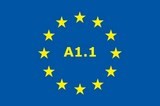Level A1.1 of CEFR (Common European Framework of Reference for languages)

Level A1.1 is the minimal level of skill of the Common European Framework of Reference for languages (CEFR). Level A1.1 constitutes the assessable minimal level of skill in French, in oral (listening, speaking) as in the paper (reading, writing), which already possess or can acquire absolute beginners in French as a foreign language.
The global skill of communication at the level A1.1
The candidate of level A1.1:
- Can understand some familiar and daily expressions used in very recurring situations of communication as well as very simple statements aiming at satisfying certain concrete needs of the social life and can produce some.
- Can identify himself and answer questions concerning, for example, his nationality, his age, his place of residence, his school and possibly, to ask himself questions of this type to somebody.
- Can participate in an ordinary interaction, at least partially, by means of simple statements (centered on one or two words) also by using his mother tongue or other acquired languages tongues if the interlocutor speaks slowly and clearly and shows himself cooperative and friendly.
The skill in oral reception: listening
The learner can:
- understand public announcements (schedules, departure, arrival...), predictable instructions, standard recorded messages, repetitive information (educational instructions), in particular if the conditions of listening are good (either noise, or music...), if messages are pronounced slowly and / or clearly, are illustrated (plan, drawings...) or doubled by the paper and repeated.
The skill in written reception: reading
The learner can:
- recognize names, the most common words or expressions in simple situations of the everyday life: signs, handwritten indications doubled by icons, prices, schedules;
- spot and understand quantified data, proper nouns and other very simple information in a short text;
- identify globally (in their aspect, their typography, their localization) the function of certain common texts of the daily environment or the school environment;
- understand texts constituted by one or two sentences, containing familiar words and expressions (postcard or instructions).
The skill in written production: writing
The learner can:
- copy words or brief messages, write figures and dates;
- recognize various written forms: printed characters, scripts, capital letters and readable handwritten forms;
- give information about himself: his name, his nationality, his address, his age, his date of birth, in questionnaires or index cards of information;
- write a very simple message concerning the activities of the daily life containing some personal details.
The skill in oral production / interaction: speaking
The learner can:
- communicate, in a very simple way, provided that his interlocutor shows himself comprehensive, speaks very slowly and repeats if he did not understand; use elementary expressions of greeting and notice to leave;
- answer simple questions on information as the age, the origin, the language, the place of residence…
- understand, agree / refuse and execute very simple instructions;
- ask somebody of its news and react;
- ask objects, services to somebody, give or return objects, services to somebody, by managing, in particular, the numbers and the hour…
Self-assessment grid of level A1.1 of the CEFR
The CEFR describe level A1.1's user capable of carrying out the following linguistic skills:
Understanding | Listening | I can understand information of the everyday life for situations of very recurring communications (public announcements, weather report, messages, repetitive information) and to answer concrete needs for the social life. |
|---|---|---|
Understanding | Reading | I can, in a short text, spot and understand quantified data, proper nouns and other visually understandable information in situations of the everyday life (prices, schedules, signalling system, cards(maps), instructions). |
Speaking | Spoken interaction | I can communicate in a very simple way provided that my interlocutor shows himself comprehensive, speaks very slowly and repeats if I did not understand. |
Speaking | Spoken production | I can ask objects, services to somebody, to give or return objects, services to somebody. |
Writing | Writing | I can write a very simple message concerning the activities of the everyday life. I can give information onto me: name, nationality, address, age, in questionnaires or data sheets.I can copy words or brief messages, write figures and dates. I can recognize various written forms. |



